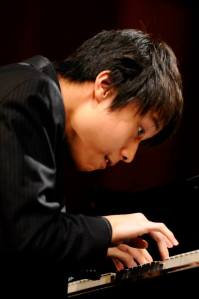Steven Lin: Life After (But Still During) The Cliburn
Nick Romeo continues his coverage for us on From the Top alums in the Van Cliburn Competition. 24-year-old pianist Steven Lin, who appeared on Show 157 when he was 17, was one of six From the Top alumni to enter the preliminary round.
LIFE AFTER (BUT STILL DURING) THE CLIBURN
by Nick Romeo
After not advancing beyond the first round of the Cliburn, Steven Lin has stayed in Fort Worth and relaxed with his host family. He shot skeet with a shotgun at a local shooting range, swam at his host family’s pool, and played with their dogs. He has also been reflecting on some basic questions about art, music, and his own life. In particular, he has been thinking about how to balance the often conflicting demands of musicmaking and self-promotion. “I admire people who have this naïve, pure love of music and don’t worry about finances. Music and business are totally opposite things. You’re not going to have room in your brain for music if you always worry about business,” he said.
Dangers lie at either of two extremes. Pursuing the practical tasks of networking and marketing can limit musical growth, while neglecting these tasks might limit career growth. “I see people grow artistically but not become very famous and I see people who worry a lot about making connections get more famous but not grow deeper as artists.”
During his years at Juilliard, Lin heard many teachers talk about the importance of being creative and innovative in order to attract new audiences. He knew they were making valid points; the market for classical music has shifted and contracted, and many of the most successful musicians have created unique media platforms to reach new audiences. Still, he felt that sometimes this success comes at a cost. “At least for me, I don’t grow artistically unless I ignore some of the business stuff. Art is about finding inspiration, and as you get older, often this happens away from the piano. If you’re constantly sitting at your computer or on the phone, you don’t get better. It happens randomly, just going through life, walking through a park you see something and maybe think about a phrase and find something interesting you want to try out.”
When Lin thinks of some of the great pianists of the 20th century, like Horowitz and Rubinstein, he sees support for his theory. “All they did was think about music. They didn’t have to spend their time on all the other stuff.” Of course there were other pianists who were similarly unconcerned with the practicalities of a career who did not achieve the singular artistry of Horowitz or Rubinstein. And it’s at least conceivable that some wonderful pianists today are also quite focused on the details of their careers. But Lin has identified a powerful tension that every young artist must confront.
Lin sometimes has trouble balancing art and business. He does have a realistic streak, and he wants his career to advance. Lately, however, he has felt the pull of a purely musical realm. “It is about what you want from your life. You have to ask yourself why are you doing music. If you want a big house and a lot of material comfort, you will have to work harder at the career side of things. Many musicians, they just want meals and a simple place to sleep.” He did four competitions in the past year. He found them stressful, but enjoyed the chance to perform. He also thinks there are some cases that are simply impossible to decide. If Horowitz and Rubinstein both played, how could you choose the winner? Still, competitions are performance opportunities, and they can help launch careers.
In the fall, he will begin an Artist’s Diploma at Curtis. As for now, he feels like he needs a break. “I need to focus on my own searching. I need to keep searching for deeper things.”
Nick Romeo’s most recent book is Driven: Six Incredible Musical Journeys. Read more at www.nickromeoauthor.com.




